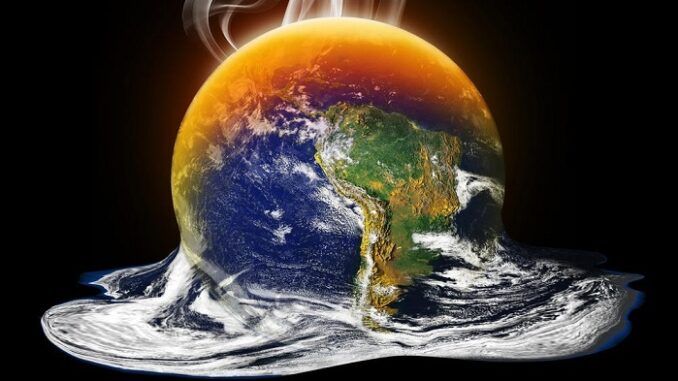
In 2023, the world’s oceans hit their hottest temperatures ever recorded, a silent yet significant milestone that speaks volumes about the state of our planet.
On January 11, 2024, a startling report was published in Advances in Atmospheric Sciences by an international research team of 34 scientists from 16 institutions worldwide, led by the Institute of Atmospheric Physics at the Chinese Academy of Sciences. The global average sea surface temperature in 2023 rose by about 0.23°C compared to 2022, reaching an all-time high since modern records began. But what does this seemingly small increase mean for our world?
Along with the record-breaking sea surface temperatures, the upper 2,000 meters of the oceans absorbed an extra 15±10 zettajoules(1 zettajoules = 10²¹ joules) of heat in 2023 compared to 2022, exceeding all observed values for ocean heat content from 0 to 2,000 meters since 1960.

What does 15 zettajoules mean?
- It’s enough to evaporate 23 billion Olympic-sized swimming pools filled with water entirely.
- It could bring the world’s largest freshwater lake, Lake Baikal, to a boil.
- It’s equivalent to around 1.58 million 2,000 kW wind turbines running at full capacity for 100 years.
We may be used to hearing the phrase “record-breaking,” but the 2023 ocean temperatures are an unprecedented reminder that climate change is occurring at a visible and alarming pace.
This unprecedented warming isn’t just a number on a chart; it’s causing a domino effect in our oceans. One immediate impact is the intensification of ocean stratification — the layering of water by temperature and density.
Normally, the oceans have a “light head, heavy feet” structure, with density increasing with depth. As the surface warms, it becomes lighter, creating a barrier that prevents the mixing of nutrient-rich, deeper waters with the surface. This “isolation effect” is where the upper and lower layers of the ocean mix with difficulty. This hinders the exchange of substances between the surface and deep ocean, preventing nutrients from upwelling to the surface and oxygen from sinking to the deep sea. This impacts the balance and health of marine ecosystems, as evidenced by the decline of Black Sea fisheries.
But the implications extend far beyond marine life or fisheries.
The oceans, acting as Earth’s largest thermal reservoir, play a crucial role in regulating global weather patterns, directly influencing global atmospheric and ocean circulation patterns, affecting weather over cities, and leading to more frequent extreme weather events that severely impact human livelihoods. Just last year, we witnessed the Mediterranean Hurricane “Danielle” caused a mega-disaster in Libya, and Super Typhoon Doksuri brought a once-in-200-year rainstorm to the Beijing-Tianjin-Hebei region. These events are closely linked to climate system changes.

Moreover, the record ocean temperatures are “attacking” exclusive economic zones in the ocean. These zones are usually rich in economic resources, but in recent years, industries in these regions have faced huge challenges from marine heat waves and extreme weather due to ocean climate change. For example, coastal and island tourism along the Mediterranean economic zone faced challenges from the “hottest Mediterranean summer on record” in the summer of 2023, including marine and atmospheric heatwaves and wildfires.
The negative impacts of ocean warming are multifaceted. On November 17, 2023, the global average temperature was 2.07°C above pre-industrial levels, and the global daily average temperature exceeded the critical 2°C threshold set by the Paris Agreement for the first time. The World Meteorological Organization has issued warnings, stressing that rapid emissions reductions are needed to meet the 2°C target. Without immediate action, we’re on a path to irreversible climate change consequences.
It’s easy to feel distance from numbers in reports and news, but the reality is that climate change is happening right here, right now. Do we continue to break records and stand by idly, or do we take action?
Source: The China Academy, Jan 31, 2024. https://medium.com/@thechinaacademy/hot-oceans-rising-concerns-the-2023-climate-alarm-df30a6b65ce4

Follow
The China Academy provides up-to-date, in-depth and contextual information about contemporary China.